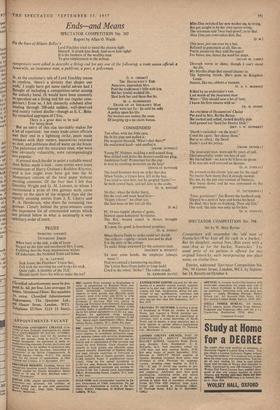Ends and Means
On the lines of Hilaire Belloc's
Lord Finchley tried to mend the electric light
Himself. It struck him dead; And serve him right! It is the business of the wealthy man To give employment to the artisan.
competitors were asked to describe a fitting end for any one of the following: a trade union official, a housewife, an insurance man, a publican, a poet, a policeman.
11F, as the cautionary tale of Lord Finchley seems to confirm, 'there's a divinity that shapes our ends,' I might have got some useful advice had I (bought of including a competition-setter among the unlucky band. (It would have been unseemly IO speculate on a fitting end for our regular corn- Petitors.) Even so, I felt distinctly subdued after reading through 200-odd sudden, well-deserved and mostly violent deaths—though as E. C. Bent- , ley remarked appropos of Clive,
There is a great deal to be said For being dead.
But an entry of this size inevitably makes for a lot of repetition: too many trade union officials met their end in a lightning strike, poets made mistakes with their meters, housewives returned to dust, and publicans died of water on the brain. The policeman and the insurance man, who were less obviously vulnerable, were correspondingly less popular.
It proved much harder to point a suitable moral than Belloc made it look : most entries were more reminiscent of Harry Graham's Ruthless Rhymes, and a few might even have got into the In Memoriam column of the local paper without exciting comment. Of the four best I felt that Dorothy Wright and G. NI. Lawson, to whom I ! recommend a prize of two guineas each, came nearer to the spirit of the original than did the equally amusing entries from J. E. Cherry and ' R. A. Henderson, who share the remaining two guineas. Closely behind the prize-winners come the impressive list of commended entries which are printed below in what is necessvily a very arbitrary order of merit.
PRIZES
(DOROTHY WRIGHT) DETERGENT DIRGE When busy at the sink, a tide of foam Surged up the pipe and smothered Mrs. Loam, fulfilling thus the deep, unconscious wishes Of fishermen, the National Trust and fishes.
(G. M. LAWSON)
Jack Jones. the Plumbers' Union Sec., Fell with the morning tea and broke his neck.
Quite right. A member of the TUC Should surely leave his wife to make the tea?
J. E. CHERRY) THE HOUSEWIFE'S END
Amorous, imprudent Mrs.
Paid the tradesmen's bills with krs. But her lawful wedded Mr.
Shot both her and them that kr.
(R. A. HENDERSON) DEATH OF AN INSURANCE MAN
George went too far : he sold his wife A policy upon his life.
No woman can endure the onus Of keeping up a no-claim bonus.
COM MENDED
Too often, with foo little care, He lit his pipe and puffed it :
His sergeant shouted, 'What's that there?'
Be swallowed hard—and snuffed it.
(FRANK DIONNILL)
Young PC Holmes, tackling a well-armed thug, Was drilled with holes the doctors could not plug. Ambitious fool! Promotion for the cop Is won by catching motorists on the hop!
(DOUGLAS HAWSON)
The local boatmen were on strike that day When Noaks, a Union boss, fell in the bay. Two tried to save him; but he gurgled 'Scabs !'— So both rowed back, and left him to the crabs.
(G. H. IIAXTER)
Mother, when the boiler burst, Hit the roof and stuck head first— 'Happy release!' we often say; She had been on her feet all day.
PC 19 was tappin' phones o' gents,
I-fintent upon hobtainin' hevidence.
The flex, wound round 'is throat, brought Nemesis.
'Es now, for good, in henclosed premises.
(D. R. PEDDY) When Henry Dubb to strike could not decide The strikers—rightly—struck him arid he died. It is the duty of the artisan
To make things awkward for the common man.
(MAURICE B. RECKITI)
To save some hands, the employer (always mean!) Had introduced a hammering machine.
The Union Boss (from habit or from luck) Cried to the robot, 'Strike!' The robot struck.
(R. KENNARD DAVIS) (P. to.)
This poet, just run over by a bus, Refused to punctuate at all, like us. Poetic justice (so they told the cops)! For buses, too, detest the need for stops.
(ALLAN M. LAING)
Through storm or shine, though I can't stand the din, My Martha plugs that cursed cleaner in.
The lightning struck. She's gone to Kingdom Come.
Nature, like me, abhors a vacuum.
(P. A. V. MADDEN)
Killed by an undertaker's van, Last words of the insurance man Were—'This should save a lot of fuss; 1 know his firm insures with us.'
(w. 0. DAISH)
An overdose of Housewives' Choice Put paid to Mrs. Bertha Boyce.
She rocked and rolled, turned deathly pale And gasped out 'Send for Doctor Dale!'
(REV. J. W. KENNEDY)
'Death's excluded—on the level!' Cried the agent, 'See clause three.' But to no effect: the Devil Hadn't read the policy.
(FRANK DUNNILI )
The insurance man, worn out by years of toil. Died peacefully; under ten feet of soil We buried him—we knew he'd have no peace If he was not well covered on decease.
(S. H. FINDLAY)
He pressed on his clients 'just one for the road' No matter how many they'd already stowed. His inn, by the just intervention of Nemesis, Was burnt down, and he was consumed on the premises.
(E. TATTERSHALL)
'Time, gentlemen!' Jim Brown the landlord said, Slipped in a pool of beer and broke his head. He died; they kept on drinking; 'Poor old Jim,' One said, 'the time was only Up for him.'
(s. H. FINDLAY) ?Ass Dim switched her new washer on, to wring, But got caught in by her own apron-string, The salesman said 'twas fool-proof; as to that Miss Dim just contradicts him, flat.
(r.


































 Previous page
Previous page